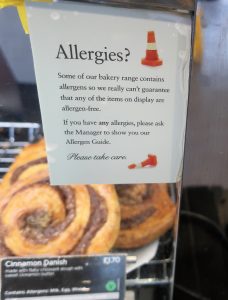Impact of Natasha’s Law on FBOs and consumers evaluated by FSA

A new report by the Food Standards Agency (FSA) has found that while most businesses are aware of Natasha’s Law, just over half feel they have the necessary information needed to follow it.
The FSA report – ‘Evaluation of the implementation of prepacked for direct sale (PPDS) allergen labelling requirements’ – looks at the impact Natasha’s Law has had on both businesses and consumers.
Officially named the UK Food Information Amendment 2019, the law was enforced in October 2021 following the death of Natasha Ednan-Laperouse. The 15-year-old, who had a severe sesame allergy, sadly died after eating a prepacked baguette which did not have the ingredients listed. She collapsed on a flight from Heathrow to Nice in July 2016 and despite her father administering two EpiPen injections, she died within hours.
Natasha’s Law requires businesses selling PPDS food to include a label with the product name and full ingredients list to each individual item, with all allergens highlighted within the list.
FSA EVALUATION
One year after it became a legal requirement across the UK, the FSA wanted to evaluate its implementation and the effect it has had on three key groups: Food Business Operators, Local Authorities and consumers with food hypersensitivities (FHS).
The FSA surveyed some 900 food business operators (FBOs) right across the UK, including 52 from Northern Ireland, as well as over 1800 consumers, including 102 from Northern Ireland. They also contacted all 398 local authorities, including all 11 Northern Ireland councils, receiving feedback from 124.
Nine out of 10 businesses (91%) said they were aware of the law, with 68% stating they felt they all the information needed to follow it.
Half of the FBOs said the new labelling requirements had increased their costs, mainly due to investment in new equipment or materials.
When looking at business practices, 81% of the businesses surveyed said they had made changes to their operations as a result of the new legislation, including asking customers at the point of sale (POS) if they had any allergies or food intolerances.
LIVES IMPROVED
Just over a quarter (26%) said they had changed they foods they sell, with 17% selling food that was previously PPDS as non-prepacked food and 16% selling more food packaged by other firms.
From a consumer perspective, 40% of people living with food hypersensitivity said their lives had been improved, with the greater impact felt amongst younger people aged between 18 and 34.
The FSA has committed to continuing to monitor the impact of the allergen labelling law and “local authorities will continue to make sure businesses are complying with it to keep people with food allergies safe”.
You can read the full report here: https://www.food.gov.uk/print/pdf/node/17131







